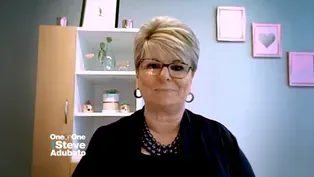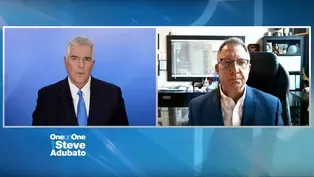One-on-One
Services provided by NJ State Veterans Chamber of Commerce
Clip: Season 2025 Episode 2811 | 9m 20sVideo has Closed Captions
Services provided by NJ State Veterans Chamber of Commerce
Steve Adubato sits down with Colonel Jeff Cantor, Ret. US Army, CEO of the NJ State Veterans Chamber of Commerce, and Director of Product Development & Partnerships of MA Salute at Braven Health, to examine how the NJ State Veterans Chamber of Commerce helps provide economic, educational, and networking opportunities for veteran entrepreneurs.
Problems with Closed Captions? Closed Captioning Feedback
Problems with Closed Captions? Closed Captioning Feedback
One-on-One is a local public television program presented by NJ PBS
One-on-One
Services provided by NJ State Veterans Chamber of Commerce
Clip: Season 2025 Episode 2811 | 9m 20sVideo has Closed Captions
Steve Adubato sits down with Colonel Jeff Cantor, Ret. US Army, CEO of the NJ State Veterans Chamber of Commerce, and Director of Product Development & Partnerships of MA Salute at Braven Health, to examine how the NJ State Veterans Chamber of Commerce helps provide economic, educational, and networking opportunities for veteran entrepreneurs.
Problems with Closed Captions? Closed Captioning Feedback
How to Watch One-on-One
One-on-One is available to stream on pbs.org and the free PBS App, available on iPhone, Apple TV, Android TV, Android smartphones, Amazon Fire TV, Amazon Fire Tablet, Roku, Samsung Smart TV, and Vizio.
Providing Support for PBS.org
Learn Moreabout PBS online sponsorship(upbeat music) - Hi, everyone, Steve Adubato.
We kick off the program with a compelling, important conversation with Colonel Jeff Cantor, retired Army colonel and chief executive officer of New Jersey Veterans Chamber of Commerce.
Colonel, good to see you.
- Great to see you, Steve.
Great to be here with you.
- Website's up, tell everyone what the Veterans Chamber of Commerce is.
- Yeah, so we started this back in 2018 to really provide economic opportunities for veterans.
There's a lot of resources available for the surviving part of veteran care, but not so much in the thriving part.
So that's why we established the Veterans Chamber and got traction with the state of New Jersey to try and really produce more economic development opportunities for the veterans community.
- You came to our attention through our mutual friend, John Pearson, Jonathan Pearson.
And when John was talking to us about you, one of the things he said is that your commitment to veterans, and again, thank you for your service, Colonel.
- Thanks.
- Your commitment to veterans, particularly helping veterans get into businesses and start their own business, become entrepreneurs, is so important because it's this massive gap between the rhetoric, "Thank you for your service, we appreciate it," and the actions of actually making a difference for folks.
Why is this so passionate for you?
- Yeah, Steve, you wrote a book on leadership and you know how important it is to lead from the front.
And as a leader in the military, you never really stop providing a way forward for your troops.
So in this role, in this capacity, I continue to lead to try and help others establish themselves and create a bigger economic piece of the pie for the veterans community and military spouses.
It's really, really important.
I think it's vital that we get the state to enforce the set-aside laws that's been in place since 2015 to provide a way forward for the veterans community and-- - Hold on, Colonel, take a step back.
- Yeah.
- Make it clear that the state of New Jersey has specific set-aside laws.
What exactly does it say the state is supposed to do?
Then we'll talk about what the state actually does.
Please, Colonel.
- Absolutely.
So in 2015, the state of New Jersey passed a law stating that they are to set aside 3% of all state contracts for disabled veteran-owned businesses.
Initially, the state never enforced the law, and then under Governor Murphy's tenure, we got the state to provide some sort of enforcement on it to work towards 3% set aside for state contracts.
- Yeah, but we're not close.
- Yeah, it's an unfortunate situation.
We're not close at all.
So the state first tracked the data in 2021.
And in 2021, the state provided 0.53% set-asides for disabled veteran-owned businesses.
That's roughly $21 million in contracts.
In 2022, that number jumped up to $54 million, or roughly .9% of state contracts.
So nowhere near the 3%.
And if you compare that to New York State, New York State currently awards 374 million in contracts to disabled veteran-owned businesses, close to 6%.
So we're far behind our neighbors.
We really need to do a better job at enforcing this law and providing economic opportunities for veterans in our state.
- Colone, help us understand this in a way that only you and those who served and choose to, well, they don't choose to transition, you have to transition.
If you don't, we know what happens, and the suicide rates are what they are.
There are veterans who are homeless, right?
But I often wonder, and you're obviously, Colonel, in a unique position to respond to this, how incredibly difficult is it to transition from a military life, a way of life, to civilian slash business life?
I mean, I grew up in this, I didn't know anything else.
I can't even imagine what that transition is like.
Please, Colonel.
- Yeah, Steve, you raise a very, very important point.
Transitioning outta the military is one of the most difficult things you could do because you're going for something that you totally understand, a way of life that you've lived for years, now you're trying something completely new and different, and don't know anything about the way forward.
So when veterans come out of the military and they wanna establish a business, A, they don't have the networks that their non-veteran counterparts have, and B, they don't have access to capital like their non-veteran counterparts have.
So it's been very, very tumultuous in transitioning from the military to entrepreneurship.
What we've been trying to do is establish entrepreneurship training programs, establish networks for veterans so that they can meet buyers and supply diversity folks from various agencies, both in the public and private sectors.
And we also have access to capital events with banks and CDFIs to provide a way forward for funding their businesses.
But it has been a very difficult transition, to your point.
- I also wanna make clear that the colonel, that Jeff and his colleagues at the chamber are part of New Jersey Diverse Business Advisory Council, other chambers of commerce, the African American Chamber of Commerce, the Hispanic Chamber of Commerce.
I'm always curious about this, you're a nonprofit, we're a nonprofit.
We work way more than half the time raising money to be able to do this.
Where does your money come from?
- So our money comes from the generosity of private sector entities, like Horizon, Blue Cross Blue Shield, like Johnson & Johnson, like Provident Bank, like TD Bank.
They've stepped up and provided needed resources to our chamber, and there are multiple agencies and entities that have stepped up.
Additionally, in 2022, we got a grant from the state of New Jersey to provide outreach and support for the veterans business community, which was great, it was a one-time grant, which significantly helped out with veterans outreach and programming for veterans.
So it's a constant effort to try and raise funds.
We're always trying to do that.
Not only that, we have the Veterans Foundation of America, which is our foundation, and we provide support for like mental health resilience training, which is really important, outdoor therapy programs, to try and help veterans on a medical, healthcare and mental health basis.
- PS, the website is up.
If people want to contribute, there's a way to do it on the website.
And last question, for those of us who want to support veteran-owned businesses, support veterans, how the heck would we know that a business is a veteran-owned business?
- That's a great question.
So there is a certification process in the state of New Jersey and with the federal government, and there are lists that are out there.
But the best thing to do is just contact the Veterans Chamber.
Besides contacting the Veterans Chamber, there's also a portal, warriorportal.com, which will house sites for veteran businesses to let them know that there are veteran business out there.
There's also the NJ Savvy Program, which is run by the Department of Treasury in the state of New Jersey.
And you can download all the lists of veteran-owned businesses, disabled veteran-owned businesses, African American-owned businesses, Hispanic-owned businesses, LGBTQ-owned businesses, so that you can reach directly out to them.
- Colonel, thank you for the work you're doing, and once again, thank you for your service.
We appreciate it, Colonel Jeff Cantor.
Thank you, Jeff.
- Thank you, Steve.
- You got it.
Stay with us, we'll be right back.
- [Narrator] One-On-One with Steve Adubato is a production of the Caucus Educational Corporation.
Funding has been provided by RWJBarnabas Health.
Let’s be healthy together.
The New Jersey Economic Development Authority.
Johnson & Johnson.
PSE&G.
The North Ward Center.
New Jersey’s Clean Energy program.
The Russell Berrie Foundation.
The Adler Aphasia Center.
And by EJI, Excellence in Medicine Awards.
Promotional support provided by The New Jersey Business & Industry Association.
And by ROI-NJ.
- The New Jersey Board of Public Utilities offers programs to help New Jersey residents save money and energy so we can all participate in making a cleaner and healthier New Jersey.
Our Free Comfort Partners program helps income qualified residents create a more comfortable home with energy efficient upgrades, which can help reduce your bills.
And our community solar program can help you save on your utility bills, even if you don't have an appropriate roof for solar.
Learn more at NJ.gov/BPU.
NJ Sharing Network's commitment to giving back
Video has Closed Captions
NJ Sharing Network's commitment to giving back (8m 9s)
The role of trade schools in addressing healthcare shortages
Video has Closed Captions
The role of trade schools in addressing healthcare shortages (9m 8s)
Providing Support for PBS.org
Learn Moreabout PBS online sponsorshipSupport for PBS provided by:
One-on-One is a local public television program presented by NJ PBS













